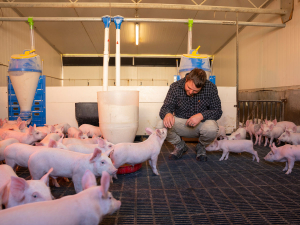NZPork Urges Government to Protect Productive Rural Land in Planning Reform
NZPork says the Government needs to strengthen its proposed planning laws to ensure New Zealand's pig farmers can continue to produce pork.
 Pig farmers claim the Government is saying land impacted by the policy should only be for certain types of farming and pig farming is not one of those.
Pig farmers claim the Government is saying land impacted by the policy should only be for certain types of farming and pig farming is not one of those.
The Ministry for the Environment (MfE) has found itself in a stoush with NZPork over the controversial National Policy Statement for Highly Productive Land (NPS-HPL).
The NPS-HPL aims to ensure the availability of favourable soil for food production while more land is opened up for housing projects.
Last week, pork farmers accused MfE, along with local councils, of misinterpreting the policy statement, leading to the exclusion of pig farms from land suitable for agriculture.
NZPork chief executive Brent Kleiss says it has been led to believe that the MfE is saying land impacted by the policy should only be for certain types of farming and pig farming is not one of those.
“This interpretation of the policy will make it hard for new pig farms to be established and for existing farms to grow or change the way they do things,” Kleiss says.
He says pig farms are often part of bigger farms where pig manure is used as a natural fertiliser on cropping and pastoral land.
“This is why many pig farms are on land that’s considered good for farming under the policy,” he says.
Kleiss says NZPork has asked the Government to change its policy to ensure it protects good farming land while allowing for pig farming.
He says consultation on the proposed NPS-HPL stated the intention to protect highly productive land for ‘primary production purposes’ in an effort to avoid the loss of highly productive land to uncoordinated urban expansion and rural land fragmentation.
“NZPork supported that,” he says. “However, the published version of the statement changed that wording to ‘land-based primary production’.”
Kleiss says this is being interpreted by MfE staff to mean that despite being a primary production food-producing activity, indoor primary production activities like pig farms are an inappropriate land use on highly productive land.
“We are also seeing this interpretation from councils as they begin to implement the NPS-HPL.
“We believe the current interpretation of the policy is inconsistent with its original intent of protecting highly productive land for primary production and represents an overreach in a policy initially proposed to protect land valued for food production from urban activities.”
MfE says the Government has committed to reducing consenting barriers for infrastructure, housing and primary production.
“This includes MfE exploring options to amend the NPS-HPL to enable more flexibility of what activities can occur where,” a spokesperson told Rural News.
The spokesperson says officials have reviewed submissions from consultation last year on two potential amendments to the NPS-HPL.
“These related to the development of new specified infrastructure: renewable energy generation, intensive indoor primary production such as pig farming and greenhouses on HPL.
“Ministers will seek a Cabinet decision on these potential changes later this year.”
Castle Ridge Station has been named the Regional Supreme Winner at the Canterbury Ballance Farm Environment Awards.
The South Island Dairy Event has announced Jessica Findlay as the recipient of the BrightSIDE Scholarship Programme, recognising her commitment to furthering her education and future career in the New Zealand dairy industry.
New Zealand and Chile have signed a new arrangement designed to boost agricultural cooperation and drive sector success.
New DairyNZ research will help farmers mitigate the impacts of heat stress on herds in high-risk regions of the country.
Budou are being picked now in Bridge Pā, the most intense and exciting time of the year for the Greencollar team – and the harvest of the finest eating grapes is weeks earlier than expected.
The Real Estate Institute of New Zealand (REINZ) has released its latest rural property report, providing a detailed view of New Zealand’s rural real estate market for the 12 months ending December 2025.

OPINION: A mate of yours truly reckons rural Manawatu families are the latest to suffer under what he calls the…
OPINION: If old Winston Peters thinks building trade relations with new nations, such as India, isn't a necessary investment in…